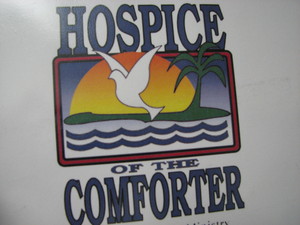First off, if you’re reading this, you have my deepest sympathies. It is extremely painful to have a loved one die of cancer.
You may or may not have spoken to a hospice worker before. If you have not, there are some basic things you should know about hospice. Primarily, hospice is the final stage for a cancer patient and their families. Your oncologist must refer you into hospice, and sign paperwork indicating he does not expect his patient to survive beyond six months, and that further chemotherapy or radiation treatment will not, in his opinion, do more good.
This does not mean your loved one will die within those six months. My mother died of Stage IV cancer after a two and a half year fight, and I’ve learned from both my personal experience with her and talking to other families that a person’s remaining time depends on them. There are people who’ve lived in hospice, without treatment, for a year or longer, while others die within a few days of entering hospice. Treat entering hospice as a guideline: you know now that there won’t be a remission, so cherish the time you have.
There are some things you can do when your oncologist tells you it’s time for hospice. For starters, it’s imperative to get the hospice paperwork from your physician in as quickly as possible. Most of the time, your oncologist will be the one to issue the admitting paperwork. They will know the nearest hospice and refer you into them; if there’s another hospice you or your loved one would prefer, be sure to tell him so he can admit them into that hospice. You can ask your oncologist to call hospice to alert them even before the paperwork is issued.
This does not mean that your loved one will immediately enter hospice, but by having the paperwork issued immediately, hospice is now a viable option for you. Your loved one won’t actually be admitted to hospice until you and they, if they are capable, have signed paperwork admitting them. However, once your oncologist has alerted hospice and issued his paperwork, you have the option of calling hospice.
I would suggest calling hospice the day your oncologist gets the paperwork in, and scheduling an appointment for a hospice social worker to come out and talk to you the following day. This is a good option because the social worker can explain what hospice is, what they can do for you and your loved one, and can work with you to finish the admission of your loved one into hospice. The social worker can and will, if requested, provide counseling on the spot for your loved one as well; I would also suggest asking for this because no matter how prepared your family is for learning that your loved one is dying, it will still hit all of you like a train on the day that vague knowledge becomes hard fact.
Even if you do not immediately elect to put your loved one into hospice, hospice can still assist you. It’s common, as your loved one deterioriates, to need hospital equipment such as a bedside commode and hospital bed; hospice can and will work with you to arrange these. Our local hospice had a bedside commode to me less than three hours after I first called them and asked for one. When the equipment is no longer needed, hospice will also arrange for it to be removed for you.
There are other essential services hospice offers that will be invaluable to you and your loved one as they continue the process of dying. Once your loved one is admitted to hospice, a hospice nurse will arrive–usually within the same day–to assess your loved one’s condition. She will be able to recommend steps to consider, including equipment, and will also be able to order a home health aide who will assist your loved one in bathing and personal hygiene. I would strongly recommend asking the hospice nurse to do a complete pain assessment as well. Hospice’s entire goal is to ease a person’s final time and prevent them from suffering. A hospice nurse can contact your oncologist, who should still be managing your loved one’s pain, and request the pain meds be increased if necessary. You can also call your oncologist and make the same request; he or she might be able to give you verbal permission to increase pain meds over the phone, and it will likely be significantly faster than relying solely on the hospice nurse.
Hospice can also provide counseling for you and your family. I have little personal experience in this because of how quickly my mother died once she entered hospice, but I do know that she spoke for some time to the hospice social worker during the initial visit and it helped her come to terms with what was happening to you. Our local hospice offers counseling through their on-staff clergy as well as social workers.
Some final thoughts: if you have questions or concerns, write them down and discuss them with the hospice workers. Don’t hesitate to call them day or night for anything, even just someone to talk to; they’ll be the first to tell you that’s what they’re there for. If your loved one needs regular medical supplies, have hospice order them for you and have them see if your insurance will cover it that way, if that’s an issue. Give them your insurance information and let them handle the rest; they’re good at that too.
The best of wishes to you and yours. Good luck.

